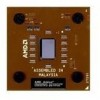AMD AXDA3200DKV4E Data Sheet - Page 88
INTR Pin, JTAG Pins, K7CLKOUT and K7CLKOUT# Pins, Key Pins, NC Pins, NMI Pin, PGA Orientation Pins
 |
View all AMD AXDA3200DKV4E manuals
Add to My Manuals
Save this manual to your list of manuals |
Page 88 highlights
Preliminary Information AMD Athlon™ XP Processor Model 10 Data Sheet 26237C-May 2003 INTR Pin JTAG Pins K7CLKOUT and K7CLKOUT# Pins Key Pins NC Pins NMI Pin PGA Orientation Pins PLL Bypass and Test Pins PWROK Pin INTR is an input from the system that causes the processor to start an interrupt acknowledge transaction that fetches the 8-bit interrupt vector and starts execution at that location. TCK, TMS, TDI, TRST#, and TDO are the JTAG interface. Connect these pins directly to the motherboard debug connector. Pull TDI, TCK, TMS, and TRST# up to VCC_CORE with pullup resistors. K7CLKOUT and K7CLKOUT# are each run for two to three inches and then terminated with a resistor pair: 100 ohms to VCC_CORE and 100 ohms to VSS. The effective termination resistance and voltage are 50 ohms and VCC_CORE /2. These 16 locations are for processor type keying for forwards and backwards compatibility (G7, G9, G15, G17, G23, G25, N7, Q7, Y7, AA7, AG7, AG9, AG15, AG17, AG27, and AG29). Motherboard designers should treat key pins like NC (No Connect) pins. A socket designer has the option of creating a top mold piece that allows PGA key pins only where designated. However, sockets that populate all 16 key pins must be allowed, so the motherboard must always provide for pins at all key pin locations. See "NC Pins" for more information. The motherboard should provide a plated hole for an NC pin. The pin hole should not be electrically connected to anything. NMI is an input from the system that causes a non-maskable interrupt. No pin is present at pin locations A1 and AN1. Motherboard designers should not allow for a PGA socket pin at these locations. For more information, see the AMD Athlon™ Processor-Based Motherboard Design Guide, order# 24363. PLLTES T#, PLLBY PAS S#, PL LMO N1, P LLMON 2, PLLBYPASSCLK, and PLLBYPASSCLK# are the PLL bypass and test interface. This interface is tied disabled on the motherboard. All six pin signals are routed to the debug connector. All four processor inputs (PLLTEST#, PLLBYPASS#, PLLMON1, and PLLMON2) are tied to VCC_CORE with pullup resistors. The PWROK input to the processor must not be asserted until all voltage planes in the system are within specification and all system clocks are running within specification. For more information, Chapter 9, "Signal and Power-Up Requirements" on page 43. 76 Pin Descriptions Chapter 11















